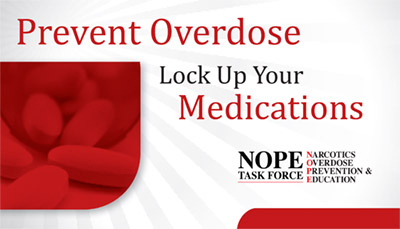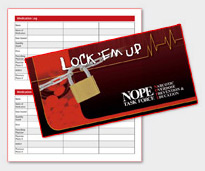Lock 'Em Up

Commonly Abused Pharmaceuticals
Prescription drugs can be beneficial and essential for treating many illnesses when prescribed and taken as directed under a physician's supervision. However, when taken in larger amounts or for other reasons, or by other persons than those intended by the prescribing physician, they can be dangerous and even deadly.
Contrary to popular belief, the most common way that children obtain these drugs is not "on-line" or from "doctor shopping". Most children pilfer these medications from their parents, friends, and grandparent's medicine cabinets.
Click Here to View Commonly Abused Pharmaceuticals.
How Can I Keep My Child From Abusing Prescription Medications?
- Safeguard all drugs at home. Monitor quantities and control access. Take note of how many pills are in a bottle or pill packet, and keep track of refills. This goes for your own medication, as well as for your teen and other members of your household.
- If you find you have to refill medication more often than expected, there could be a real problem-someone may be taking your medication without your knowledge.
- If your teen has been prescribed a drug, be sure you control the medication, and monitor dosages and refills.
- Set clear rules for teens about all drug use, including not sharing medicine and always following the medical provider's advice and dosages.
- Make sure your teen uses prescription drugs only as directed by a medical provider and follows instructions for over-the-counter (OTC) products carefully. This includes taking the proper dosage and not using with other substances without a medical provider's approval.
- Teens should never take prescription or OTC drugs with street drugs or alcohol. If you have any questions about how to take a drug, call your family physician or pharmacist.
- Be a good role model by following these same rules with your own medicines. Examine your own behavior to ensure you set a good example. If you misuse your prescription drugs, such as share them with your kids, or abuse them, your teen will take notice. Avoid sharing your drugs and always follow your medical provider's instructions
Life Saving Homework For Parents and Caretakers

- Examine the contents of their medicine cabinets for any expired or unnecessary prescription medications and discard according to Department of Environmental Protection regulations (below)
- Take the remaining necessary prescriptions out of the medicine cabinet and count the number of pills in each bottle.
- Construct a medication log for the remaining prescriptions. *
- LOCK THEM UP! Lock the commonly abused medications in a secure location.
* To Request a NOPE Medication Log Book Click Here
How Do I Dispose of My Expired and Unused Medications?
Law Enforcement Drop Off
Many Local Law Enforcement Agencies across the country have adopted a planned drop off date and location where community members may relinquish unwanted medications to be disposed of properly by Law Enforcement. Check with your local agencies to see if an organized drop off is available in your community.
Department of Environmental Protection Homeowner's Guide to Disposal of Unwanted Medications
- Do Not give drugs to anyone else!
- Do Not put drugs in the trash without disguising them! Human or animal scavengers may find them and misuse them.
- Do Not flush that leftover medicine! It can cause contamination to the aquatic environment because of wastewater treatment systems are not designed to remove many of these medications.
To protect the environment, please use these guidelines instead of flushing medications.
- Keep in the original container. This will help identify the contents if they are accidentally ingested.
- Mark out your name & prescription number for safety.
- For pills: add some water or soda to start dissolving them.
- For Liquids: add something inedible like cat litter or dirt.
- Close the lid and secure with duct or packing tape.
- Place the bottle(s) inside an opaque (non see-through) container like a detergent container.
- Tape that container closed.
- Hide the container in the trash. Do not put it in the recycle bin!